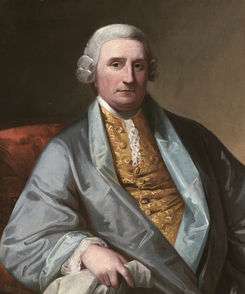Henry Middleton
| Henry Middleton | |
|---|---|
|
Possible portrait by Benjamin West, circa 1771[1] | |
| 2nd President of the Continental Congress | |
|
In office October 22, 1774 – October 26, 1774 | |
| Preceded by | Peyton Randolph |
| Succeeded by | Peyton Randolph |
| Personal details | |
| Born |
1717 near Charles Town, Province of South Carolina |
| Died |
June 13, 1784 (aged 66–67) Charleston, South Carolina |
| Spouse(s) | Mary Williams |
| Occupation | Planter, public official |
Henry Middleton (1717 – June 13, 1784) was a planter and public official from South Carolina. A member of the colonial legislature, during the American Revolution he attended the Continental Congress and served as that body's presiding officer for a few days in 1774. He left Congress before it declared independence. Back in South Carolina, he served as president of the provincial congress and senator in the newly created state government. After his capture by the British in 1780, he accepted defeat and returned to the status of a British subject until the end of the war.
Early life and family
Henry Middleton was born in 1717 near Charleston, Province of South Carolina, to Arthur Middleton (1681–1737) and Susan Amory (1690-1722), on the family plantation, "The Oaks".[2] Henry's father Arthur Middleton was a wealthy planter who had served as an acting governor of South Carolina. Henry was educated in England before returning to South Carolina to inherit his father's plantation. He became one of the largest landowners in the colony, owning 50,000 acres (200 km2) and about 800 slaves.[2]
Middleton married Mary Williams in 1741, with whom he would have five sons and seven daughters.[2] After Mary’s death in 1761, Middleton would go on to marry twice more, second to Maria Henrietta Bull (in 1762) and third to Lady Mary McKenzie (in 1776).[2]
Public offices
Middleton served in a variety of public offices in South Carolina. He was a justice of the peace and a member of the Commons House of Assembly, where he was elected speaker in 1747, 1754, and 1755.[2] He was a member of provincial council, but resigned in 1770 in opposition to British policy.[2]
In 1774, at the outset of the American Revolution, Middleton was selected as a delegate to the Continental Congress. He served as that body's president during the last few days of the First Continental Congress, following the departure of Peyton Randolph.[3] Middleton opposed declaring independence from Great Britain, and resigned from the Second Continental Congress in February 1776 when more radical delegates began pushing for independence.[2] He was succeeded in Congress by his son, Arthur Middleton (1742–1787), who was more radical than his father and became a signer of the Declaration of Independence.[2]
After Middleton's return to South Carolina, he was elected president of the provincial congress and, beginning on November 16, 1775, served on the council of safety.[2] In 1776, he and his son Arthur helped frame a temporary state constitution.[2] In 1779, he became a state senator in the new government.[2]
When Charleston was captured by the British in 1780, Middleton accepted defeat and status as a British subject. This reversal apparently did not damage his reputation in the long run, due to his previous support of the Revolution, and he did not suffer the fate of having his estates confiscated, as many Loyalists did after the war.[2]
Death and legacy
Middleton died on June 13, 1784 in Charleston.
His grandson, also named Henry (1770–1846), had a long career in politics. He was Governor of South Carolina (1810–1812), U.S. Representative (1815–1819), and the minister to Russia (1820–1830). Some of Middleton's children married into prominent families. Daughter Henrietta married Governor Edward Rutledge, Sarah was the first wife of Charles Cotesworth Pinckney, and his daughter Susannah married John Parker.[2]
His descendants include the politician Baldur von Schirach, through the latter's mother Emma Middleton Lynah Tillou.
References
- ↑ "Portrait of a Gentleman, thought to be Henry Middleton (1717–1784) c. 1771". philipmould.com. Retrieved August 16, 2010.
- 1 2 3 4 5 6 7 8 9 10 11 12 13 John G. Van Deusen, "Middleton, Henry", Dictionary of American Biography (revised edition, New York: Scribner's, 1961), 6:600.
- ↑ Calvin C. Jillson and Rick K. Wilson, Congressional Dynamics: Structure, Coordination, and Choice in the First American Congress, 1774–1789 (Stanford University Press, 1994), 51.
External links
| Political offices | ||
|---|---|---|
| Preceded by Peyton Randolph |
President of the First Continental Congress October 22, 1774 – October 26, 1774 |
Succeeded by Peyton Randolph (as President of the Second Continental Congress) |
